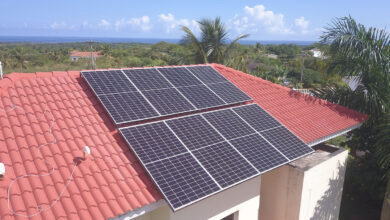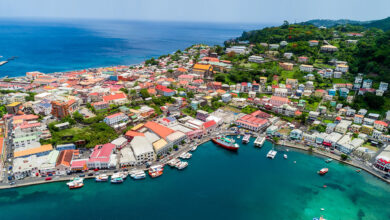It is a pleasure to be here with you this morning to address the major stakeholders in our energy sector.
At the outset, I wish to thank the Caricom Secretariat and our other development partners for the support they have given us and continue to give us during this week.
Ladies and Gentlemen, this year's Energy Symposium comes at an important time. On a national level, access to affordable, reliable and sustainable energy has never been more critical to our economic development. At the international level, the way the world uses energy will dictate how warm our planet will become and how high the oceans will rise.
It is for this reason that we must fully recognize and embrace the theme for this year's Energy Week, namely: Sustainable Energy: Powering a Green Economy. We believe that this theme is most appropriate, as it reflects the central orienting principle that should guide all civilized nations as we seek to fuel our development.
It was out of this conviction that Grenada's National Energy Policy was conceived, developed and approved by the Cabinet of Ministers in March 2011 and formally published and made a public document in November 2011. The policy document contains a 10-year Sustainable Energy Action Plan (January 2010 – December 2019) with measurable indicators or milestones of progress.
I would like to take this opportunity to report briefly to you on the progress that we have made to date in implementing the Action Plan.
Institutional and Legal
As a priority, we have sought to strengthen the capacity within the Energy Division to implement the policy. A Renewable Energy Project Manager has been contracted with the primary responsibility to manage the geothermal project and we have hired a consultant to advise us on our offshore hydrocarbon programme. In collaboration with the Ministry of Education, we are seeking to identify further training opportunities for the staff in the Energy Division, including those offered by the International Renewable Energy Agency (IRENA).
However, we also recognise that in the short term we need to use external consultants to provide expert advice to the government to ensure that we enter into commercial agreements with the private sector that protect national interests. We are grateful to the OAS for providing consultants – Castalia LLC (energy experts based in Washington) that have been assisting the government in its negotiations with Grenlec on a Geothermal Resources Development Agreement and the drafting of a Geothermal Resources Development Bill, which has been completed.
We have signed a MOU with the Windward Islands Research and Education Foundation (WINDREF) at St. George's University to be able to use the capacity that exists at True Blue Campus to prepare clean energy project funding proposals and assist in managing energy projects.
I am also pleased to announce that the Government is currently reviewing a draft MOU with the Clinton Foundation with the expectation that we will be able to use their access to vast technical and financial resources to assist the Government to chart a path towards a low carbon economy.
Our administration believes that we need to build the institutional and legal capacity to effectively regulate the electric utility to ensure that the electricity rates that they charge are fair and equitable. We have signed a loan agreement with the World Bank, and together with St. Lucia, we will be establishing the Eastern Caribbean Energy Regulatory Authority (ECERA). The first meeting of the Regional Energy Committee, which will oversee the formulation of ECERA, held its inaugural meeting here in Grenada last week.
Maximising Energy Efficiency
A second priority in our 10-year Action Plan is to maximise energy efficiency wherever we can. We have started with the Public Sector. With the kind assistance of the Peoples Republic of China, we have commenced a programme to replace all of the light bulbs in the Ministerial and Financial Complexes with the most efficient LED lighting currently on the market. Technicians from China will be here next week to train our staff in the installation requirements.
It is our hope that this Chinese Assistance Programme will be further expanded to include air conditioning systems in its next phase.
Under a regional project entitled ESD Caraibes, sponsored by the Global Environmental Facility (GEF), energy efficiency standards will be developed for buildings with the intention of incorporating these standards into the national Energy Efficiency Bill and in a Building Code.
The government wishes to encourage the private sector to conduct energy audits of their facilities and we are prepared to look at ways where the government can assist industries, in particular, the hotel sector to increase the efficiency of use of electrical energy.
Transitioning to Renewable Energy
Ladies and Gentlemen, the core policy decision contained within the National Energy Policy is to wean our economy from diesel and gasoline and to transition to renewable energy both for electricity generation and for transport.
In May this year, we signed the Barbados Declaration, along with several small island states, and we made a voluntary commitment to reduce our greenhouse gas emissions by 20% below business-as-usual by 2020.
At the Rio+20 conference in Brazil in June and again at the World Energy Forum in Dubai in October this year, our Prime Minister launched GREENADA VISION 2030. This is an ambitious but realistic objective to convert Grenada to a 100% green island by 2030. The key to achieving this objective will be whether our geothermal programme is successful.
As stated earlier, we have been busy. We have drafted the necessary legislation and have negotiated the key terms with GRENLEC. There is still more work to be done, including a mapping exercise to try to pin point the steam reservoirs and an exploratory drilling phase. A full and comprehensive environmental and social impact assessment needs to be conducted before any major construction or operations will be allowed to commence.
The wind project in Carriacou is progressing. A wind turbine lease agreement has been signed with Grenlec and the utility company has commenced the equipment procurement stage.
Grenlec continues to gather wind data on mainland Grenada with the expectation that we will construct a wind farm on the mainland within the next 3 years.
The Government is concerned that the distributed generation programme using small rooftop-mounted solar panels seems to have lost momentum after the introduction of a new interconnection policy by Grenlec. This decision by GRENLEC to introduce a Buy All/Sell All net billing system is being reviewed by the Government.
We are actively pursuing the option of converting the organic streams in our solid and liquid waste streams to a fuel that can be used for electricity production.
To “green” our transport sector, which constitutes about half our primary energy demand, we will seek to introduce electric vehicles into the market as soon as the electricity grid goes green.
Ladies and gentlemen, using geothermal, wind, solar and waste-to-energy, we are convinced that we can achieve the 100% transition in our domestic economy to clean energy by 2030.
Offshore Hydrocarbon Development
We are also busy offshore. We have negotiated a Framework Energy Cooperation Agreement with the Government of Trinidad and Tobago and will use their over 100 years of experience to jump start our oil and gas industry. We hope that the first parcel of maritime area in Grenadian waters will be licensed for oil and gas exploration and production in 2013.
We are also actively engaged with the seismic companies that gathered data from Grenadian waters in the past, prior to this administration, and benefited financially from the sale of these data without the Government, to whom the data legally belongs, receiving any share of these proceeds. This situation is being rectified and we will shortly receive the first payment from one of the companies involved.
Revenue Generation
This leads me to the last area of progress that I would like to bring to your attention. In addition to the obvious revenue generating capacity of the offshore sector, the Energy Action Plan calls for the Government to aggressively seek to access grants and concessionary financing to help transform the domestic energy sector. We have been successful to date in mobilising the following funds:
A grant of 2.5 million euros from the EU for the Carriacou wind energy project
Grant funds and technical assistance from the OAS, the Commonwealth Secretariat and IRENA valued at over US$200,000.
A grant from the GEF for US$1.2 million under the ESD Caraibes project was approved just earlier this week. We will use some of these funds to establish a soft loan facility for the purchase of renewable energy and energy efficiency technology by householders and commercial establishments. The soft loan facility will be administered by the Grenada Development Bank.
Loans valued at US$2M (at 0% interest and an indefinite payback period) from SIDS DOCK. Part of these funds is to be used to finance the ECERA project.
To date, we have managed to secure approximately 17.6 million EC dollars in grants and very concessionary financing for our domestic energy sector. May I take this opportunity to thank our development partners and donor agencies for their assistance. We are not resting on our laurels. The transformation of our energy sector will be capital intensive. We estimate that it will require investments of over US$100 million dollars over the next 15 years to achieve the GREENADA Vision.
Distinguished guests and participants in this year's energy symposium, my Government is convinced that access to affordable energy will either be a major constraint to, or a major driver of, our future development depending upon the decisions that we make today.
May your deliberations be most purposeful and fruitful.
I Thank you.





